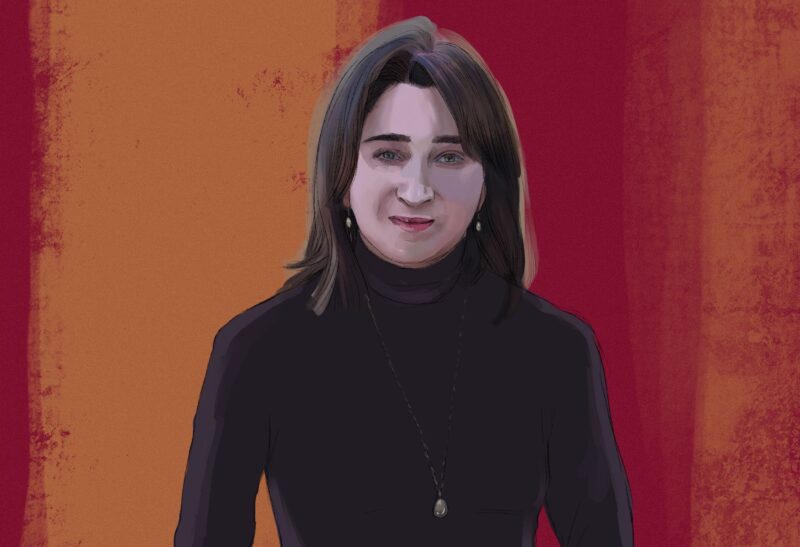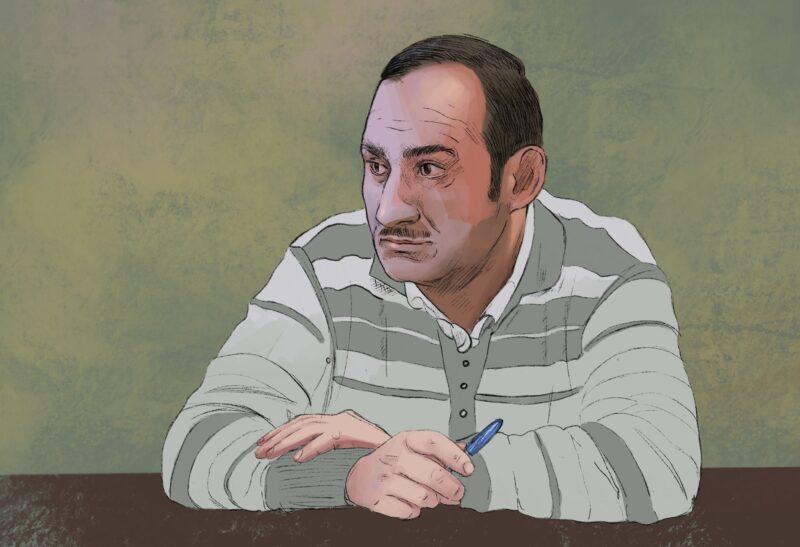

This is not an obituary. I wrote about Rashadat on Araz’s birthday, because Araz wasn’t going to read it. And after Uncle Ibrahim passed away, I decided to write about Shahin.
I will start from the very beginning. On March 7
th
2013, NIDA members began to search for Mahammad and Bakhtiyar. Then Uzeyir told us another one of our young members, Shahin Novruzlu, had disappeared (you already know where they were “found”). Of course, we tried to contact their parents. I joined the second meeting with Uncle Ibrahim. He wasn’t familiar with us, NIDA or the Ministry of National Security (MNS) prior to that day. He was afraid for Shahin, so we couldn’t convince him to hire a lawyer. With what turned out to be his usual politeness, he refused to do it. “It could be worse”, we said, since Bakhtiyar’s parents acted very differently, and we witnessed that side of them later, too (indeed, people reveal their true identities in times of despair).
The first time I met Shahin was either in May or in June. I was out to see my lawyer. The security guards made a mistake and I saw Shahin, but I didn’t recognize him. He was fuller than he appeared in photos. Khalid Baghirov introduced him to me. After meeting him I asked him if he knew me. “No,” he said. “I’m Zaur Gurbanly. The guy who “gave” you the Molotov cocktails,” I said.
In September 2013 we were familiarized with the evidence. As Shahin’s legal representative, Uncle Ibrahim was also there. We got together and talked for awhile. He always kept telling us “Take care of Shahin, don’t let him be away from you”. The guys gave Shahin a nickname, “panda”, as he was always standing quietly, apart from others. But soon we started hanging out with the youngest political prisoner in the world. He was shy and used to cover his teeth when he smiled. Four of his front teeth had been loosened by beatings in the MNS. All four of them fell out in Kurdekhany.
Our judicial proceedings went on for six months and just as Uncle Ibrahim wanted, Shahin became one of us. If my memory serves me right, it was June of this year when they let me see Shahin in the dispensary. He showed me a copy of the petition for pardon he wrote. He had already submitted it. I condemned him a little and then I tried to motivate him. At the Appeal Court everything was just as Uncle Ibrahim wanted – Shahin was our little brother.
On October 7
th
, on my wish and Uncle Ibrahim’s request, I was transferred to Shahin’s cell. We were both very happy about it. There was no time to even read. All day long we used to just chat and share our plans for after we’re released. Our joyful chats went on for eight days. We played soccer in that 12-square-meter cell, we had fun, and in those eight days Shahin told me at least eight stories about his father. When there are more females than males in a family, father and son develop a special bond. Shahin’s family was like that. That is why Shahin and his father had been close friends for 17 years.
On October 15
th
I had an appointment with my lawyer and Shahin was going to meet his relatives. On my way I saw the inmate that was responsible for distributing newspapers. “Have you heard the news? Shahin’s father passed away,” he said. Naturally, I was shocked. I talked to the lawyer for five minutes and left. On my way back to the cell I tried to figure out how to tell Shahin, or should I even tell him. I couldn’t decide, I was still shocked. Later I found out that my blood pressure had risen.
When I arrived at the cell, the guards were just taking Shahin out to see his family. I kissed him and told him to be patient. Alone in the cell, I felt like I was about to cry, but I didn’t. That’s why I felt unwell. It was cold, but it felt like I was burning. I went out in open air in my underwear. I was still sweating and in the evening I felt like I was going to black out, but I made an effort not to.
At 5 o’clock the door opened and Shahin rushed into the cell and sat on his bed. I sat next to him. As I mentioned before, Shahin is a very quiet person, hence the nickname. He sits lazily like a panda. When we played backgammon, I would always get mad and tell him, “if you’re not quick and daring, the dices won’t fall in your favor”. “When I’m alone, I can just lay there for hours and look at one point without thinking,” he would reply. I asked him once if he was offended by people calling him a panda. “No, man” he said. This quiet guy was shaking sitting next to me. My left arm was on his shoulder. I had never seen anyone shake like that. During my military service, I slept under howitzer covers on the ground, and I shook so hard that I almost went deaf from sound of my teeth chattering. But I didn’t shake like Shahin did. His whole body from head to toe was shaking. His eyes were dry. Only two or three tears fell from his eyes and onto my lap. “You can cry if you want,” I said. He shook his head, saying “no”, and put it on my shoulder. Then he turned away and lay down. Except for using the bathroom a couple of times, he didn’t get up. For about 24 hours.
Two days later I was in a meeting. On my way back the guard said to me cheerfully, “Good news. Shahin is going home.” When I entered the cell, Shahin was packing his big pile of books. I ran towards him and gave him a hug. I kissed him several times. Hugging me, he showed no emotion. My joy, his grief – the room was like a black-and-white soviet movie.
Shahin and I shared a cell for eleven days. We had fun, brainstormed and came up with a lot of ideas, played a lot of backgammon, got sad a lot, hugged a lot, had discussions where I would defend my atheism and he would defend his beliefs.
I got to meet an extraordinary guy. Let me tell you an interesting story. I consider claims of prescience – that “the poor guy felt like he was going to die. He told me to look after his kids before leaving home” – superstitious and exaggerated. But from my own experience I know about the physical bond between a parent and a child. The day Uncle Ibrahim passed away, we didn’t know anything about it. That evening I asked Shahin at least ten times, “what’s wrong with you?” Apart from his usual “panda-like” behavior, Shahin was like the walking dead that day. He just sat there, weak, upset and sad.
But soon enough Shahin came to his senses. The day he heard the news he didn’t say his daily prayers, although I insisted a few times. The next day he made up for all of the missed prayers. He prayed a lot. The day before his release he spent a lot of time discussing with me ways to make money and get an education. He realized the responsibility of his hard life. Although prison makes you tough, it also preserves that little kid somewhere deep inside. Shahin was 17 when he got arrested, but he was like a 13-14 year old kid. He was still that kid on the day of his release. Since he was 17 he had to see his best friend, his father from behind bars, wearing handcuffs. Now as a 19-year-old, he was being released and forced to grow up.
Why am I writing this? This wasn’t supposed to be an obituary. So why am I writing this? In 1898 Russian writer Engelhardt wrote in his “Progress as an evolution of cruelty” that Dickens was not a realist, because kids who got saved like Oliver Twist were rare exceptions. If Dickens’ lead character was one of the kids who worked for that Jew and got hanged at the end, that would be realism. I watched a movie today – “Life as it is”. Although the “happy ending” was much like Dickens’ realism, the title reminded me of Shahin.
What Shahin had to go through was life, as it is. When you think about the romance of being in the opposition, you should also think about life. I’m not talking about Dickens’ “real” life with “happy endings”, but Engelhardt’s tough realism that becomes crueler as it evolves – I’m talking about real life. That’s the hard way. Not everyone can be Shahin. It’s hard to be Shahin, it’s hard to pull yourself together two days after your father’s death and take responsibility for your family.
This is a hard route to take. When you get on it, you never know if your grandpa who took you to school for the first time will cut his wrists because of you; you don’t know if your father’s heart will “explode”. All because he couldn’t stand you being in jail. The main question is: should others, especially your parents suffer because you decided to take this route? This is not a rhetorical question that needs no answer. This is a hard one and it needs to be answered in solitude. I guess the newcomers will have to answer this question before they join us.
19.10.2014
BPDF



